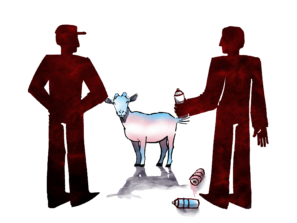

For most people, it’s a relief when they’re finally finished brushing their teeth and washing their face so they can immediately head straight to bed. However, this is often not the case for me — I groan when I’m ready for bed, knowing that my self-concocted, logically unreasonable “rituals” must follow. The following progression of habits might seem strange, but to me, they’re natural and almost necessary, as they’re a part of my Obsessive-Compulsive Disorder, or OCD.
First, I check that the light outside my door is off — three times for good measure, then I check several times under my bed, behind my rocking chair, and under my nightstand and dresser (just in case someone is hiding there waiting to set fire to my whole house). Next, I have to scan the corners of my closet, quickly count to some number that doesn’t contain a four, a six or a 13, and close the closet door slowly and with utmost care. Lastly, I check under my pillows, inside my pillows, behind my bed, and under my covers three to five times each before concluding that there is no way a horde of spiders is going to consume me in my sleep — and then, I can scan my room another three to seven times before finally turning out the light.
I was diagnosed with OCD in late spring of 2016 after exhibiting OCD-like behaviors for about a year prior. My symptoms before I was diagnosed were practically the same as my symptoms today, although they did not manifest at all until I was around 13 years old. People with OCD, including myself, experience “obsessions,” or intrusive recurrent thoughts, which lead to “compulsions,” or behaviors that soothe the anxiety caused by the obsessions. It is a relatively common disorder, affecting about 2.3 percent of adults in the United States, according to Beyond OCD, but despite this, it is often misunderstood.
Many people, from what I’ve seen, believe that OCD is something as simple as liking a neat workspace or getting bothered when something is out of place. However, this, in fact, is a very mild form of what people with OCD experience — their obsessions and compulsions actually affect their daily lives rather than merely making them slightly uncomfortable.
My own compulsions range from checking things obsessively, to spending 30 minutes brushing my teeth, to washing my hands over and over again until they become cracked and dry. These urges have caused me to stay up late checking over and over again that something is in place, leading to lack of sleep, or, in the case of the hand-washing, made my hands start to bleed or delayed me so significantly that I missed class.
For example, I play violin in Aragon’s Chamber Orchestra, and I always insist that my hands are perfectly clean before I touch my instrument. However, there isn’t any hand sanitizer in the orchestra room, so I often have to ask to leave to wash my hands towards the beginning of class. The problem with this is that the nearest sink is far away, so the combined time it takes me to walk there and back as well as wash my hands five to 12 times can add up to 15 minutes of me missing class every time I do so. Sometimes my classmates question me about this, asking, “Where do you disappear to in orchestra all the time?” and I’m never able to give an acceptably reasonable answer — they just don’t understand why washing my hands is so important to me.
It isn’t that none of my friends know about my OCD — I don’t see a point in keeping it a well-guarded secret — but that they simply cannot empathize with what I feel. For me, my obsessive thoughts force me into acting on them with compulsions, and I begin to feel distractingly anxious if I do not do so. They eat at me until I can’t ignore them any longer. My friends do not feel this way, however, so I can’t blame them for failing to comprehend the depth of my discomfort.
Honestly, I’m not even sure why I care so much about my compulsions either. Logically, I know it’s ridiculous to think that something bad will happen if I don’t check my entire bed before going to sleep in it, or if I stop counting on a number including a four, six, or 13. But for some reason, I just can’t persuade myself to stop acting on my obsessions. Even though I know I can’t help it, as it is a part of my OCD, I constantly wish I was able to “turn it off” to make my life more convenient.
Despite the challenges associated with having OCD, it does have positive effects, in its own strange way — for example, meticulous revising and work-checking when it comes to school assignments. Because of this, I take a long time to finish these assignments, but I also usually produce high-quality work. Although it is essential to understand that OCD is a mental illness and should not be taken lightly, it doesn’t need to be something inherently negative — for me, having OCD is about dealing with its drawbacks while simultaneously embracing its unique benefits. Truly, taking on the world with a similar optimistic outlook is the best way to overcome hardships and enjoy life.






Thanks for the outstanding information, it really is useful.